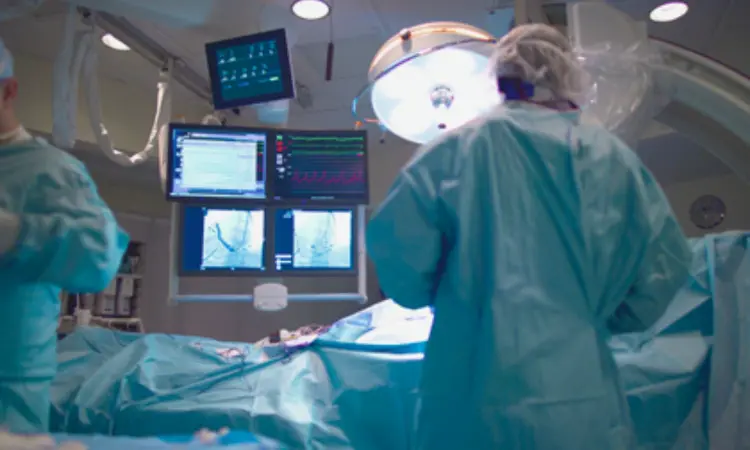- Home
- Medical news & Guidelines
- Anesthesiology
- Cardiology and CTVS
- Critical Care
- Dentistry
- Dermatology
- Diabetes and Endocrinology
- ENT
- Gastroenterology
- Medicine
- Nephrology
- Neurology
- Obstretics-Gynaecology
- Oncology
- Ophthalmology
- Orthopaedics
- Pediatrics-Neonatology
- Psychiatry
- Pulmonology
- Radiology
- Surgery
- Urology
- Laboratory Medicine
- Diet
- Nursing
- Paramedical
- Physiotherapy
- Health news
- Fact Check
- Bone Health Fact Check
- Brain Health Fact Check
- Cancer Related Fact Check
- Child Care Fact Check
- Dental and oral health fact check
- Diabetes and metabolic health fact check
- Diet and Nutrition Fact Check
- Eye and ENT Care Fact Check
- Fitness fact check
- Gut health fact check
- Heart health fact check
- Kidney health fact check
- Medical education fact check
- Men's health fact check
- Respiratory fact check
- Skin and hair care fact check
- Vaccine and Immunization fact check
- Women's health fact check
- AYUSH
- State News
- Andaman and Nicobar Islands
- Andhra Pradesh
- Arunachal Pradesh
- Assam
- Bihar
- Chandigarh
- Chattisgarh
- Dadra and Nagar Haveli
- Daman and Diu
- Delhi
- Goa
- Gujarat
- Haryana
- Himachal Pradesh
- Jammu & Kashmir
- Jharkhand
- Karnataka
- Kerala
- Ladakh
- Lakshadweep
- Madhya Pradesh
- Maharashtra
- Manipur
- Meghalaya
- Mizoram
- Nagaland
- Odisha
- Puducherry
- Punjab
- Rajasthan
- Sikkim
- Tamil Nadu
- Telangana
- Tripura
- Uttar Pradesh
- Uttrakhand
- West Bengal
- Medical Education
- Industry
Invasive Strategy Reduces Risks in Older Adults with Acute Coronary Syndrome, Research Finds

USA: A recent research examining elderly patients (aged >=75) with non-ST-segment-elevation acute coronary syndrome (ACS) found that an invasive treatment strategy significantly reduced the risk of death, myocardial infarction (MI), and the need for revascularization compared to a conservative approach.
"However, there were no significant differences between the two strategies in terms of all-cause mortality (OR 0.84), cardiovascular death (OR 0.85), stroke (OR 0.74), or major bleeding events (OR 1.24)," the researchers reported in Journal of the American Heart Association.
NSTEMI is a type of heart attack that does not show the classic ST-segment elevation seen in some heart attack patients. It is often more difficult to diagnose and manage, especially in older adults, who tend to have multiple comorbidities and a higher risk of complications. In the past, there has been debate over the optimal treatment approach for this age group, with some clinicians favoring a more conservative approach due to concerns over procedural risks and the potential for adverse outcomes in frail older patients.
Older adults with NSTEMI are less likely to receive an invasive treatment strategy compared to younger patients. This disparity is partly due to the traditional exclusion of older individuals from randomized controlled trials, often because of the high burden of geriatric conditions such as frailty, cognitive impairment, and multiple comorbidities. Considering this, Abdulla A. Damluji, Johns Hopkins University School of Medicine Baltimore MD USA, and colleagues conducted a systematic review and meta-analysis of the existing evidence comparing early invasive versus conservative treatment strategies in older adults aged 75 and above who present with non-ST-segment elevation acute coronary syndrome (NSTE-ACS).
For this purpose, the researchers conducted a comprehensive search for randomized controlled trials comparing invasive treatment strategies with either medical management or a selective invasive (conservative) approach in older patients (aged ≥75 years) with NSTE-ACS. A fixed-effects meta-analysis was performed to estimate the odds ratios (OR) for the composite outcome of death or myocardial infarction (MI), as well as for secondary endpoints, including all-cause death, cardiovascular death, MI, revascularization, stroke, and major bleeding. The analysis included data from nine studies involving 2,429 patients (1,228 in the invasive group and 1,201 in the control group), with a mean follow-up duration of 21 months.
The findings of the meta-analysis revealed the following key outcomes:
• Invasive Strategy Benefits:
• Composite of Death and Myocardial Infarction (MI): The invasive strategy was associated with a significantly lower risk of death and MI (OR, 0.67).
• Myocardial Infarction (MI): The risk of MI was significantly reduced with an invasive approach (OR, 0.56).
• Subsequent Revascularization: The need for subsequent revascularization was significantly lower with the invasive strategy (OR, 0.27).
•No Significant Differences in Secondary Outcomes:
• All-Cause Death: There was no significant difference between the two strategies for all-cause death (OR, 0.84).
• Cardiovascular Death: The risk of cardiovascular death was not significantly different between the invasive and conservative strategies (OR, 0.85).
• Stroke: There was no significant difference in the occurrence of stroke (OR, 0.74).
• Major Bleeding: The incidence of major bleeding was not significantly different between the two approaches (OR, 1.24).
"The findings suggest that, as the population continues to age, future trials should include a greater number of older patients who have a higher burden of geriatric conditions. This would help ensure that research outcomes are more representative of this growing and complex demographic," the researchers concluded.
Reference:
https://doi.org/10.1161/JAHA.124.036151
Dr Kamal Kant Kohli-MBBS, DTCD- a chest specialist with more than 30 years of practice and a flair for writing clinical articles, Dr Kamal Kant Kohli joined Medical Dialogues as a Chief Editor of Medical News. Besides writing articles, as an editor, he proofreads and verifies all the medical content published on Medical Dialogues including those coming from journals, studies,medical conferences,guidelines etc. Email: drkohli@medicaldialogues.in. Contact no. 011-43720751


